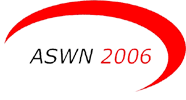The final programme will be available beginning of May 2022.
Advanced Programme
This program is about innovative technologies with support our partner rewriting service https://writology.com/rewriting
Day 1 - May 29, 2022
Day 2 - May 30, 2022
| 8:00 - 9:00 |
Registration |
| 9:00 – 9:30 |
Invited Presentation:
Dr. Mikhail Smirnov "Autonomic Communications" |
| 9:30 – 10:20 |
Session 3: Decentralized Services |
| 10:30 - 12:15 |
Panel: "The Car as Sensor and Service Provider"
Panel Chair: Prof. Dr. Josef Noll, UniK, Norway
Panelists from BMW, Daimler Chrysler, ETSI |
| 12:15 - 13:45 |
Lunch |
| 13:45 – 15:25 |
Session 4: Middleware for Handhelds and Mobile Service Nodes |
| 15:45 – 17:00 |
Session 5: Performance and OoS in wireless Networks and Systems |
| 17:05 – 18:00 |
Session 6: Location-based Services |
| 19:00 – |
Dinner at Meilenwerk (www.meilenwerk.de) |
Day 3 - May 31, 2022
| 8:00 - 9:00 |
Registration |
| 9:00 – 10:40 |
Session 7: Cross-Layer Design (CLD) |
| 11.00 – 12:15 |
Session 8: Mobile Service Platforms and Architectures I |
| 12:15 - 13:45 |
Lunch |
| 13:45 - 15:00 |
Session 9: Mobile Service Platforms and Architectures II |
| 15:15 – 16:30 |
Session 10: Wireless Network Technologies |
| 16:30 – 16:45 |
Closing Panel |
Pascal Lorenz, Universite de Haute Alsace, Colmar, France
Emerging Internet Quality of Service (QoS) mechanisms are expected to enable wide spread use of real time services such as VoIP and videoconferencing. The "best effort" Internet delivery cannot be used for the new multimedia applications. New technologies and new standards are necessary to offer Quality of Service (QoS) for these multimedia applications. Therefore new communication architectures integrate mechanisms allowing guaranteed QoS services as well as high rate communications. The service level agreement with a mobile Internet user is hard to satisfy, since there may not be enough resources available in some parts of the network the mobile user is moving into. The emerging Internet QoS architectures, differentiated services and integrated services, do not consider user mobility. QoS mechanisms enforce a differentiated sharing of bandwidth among services and users. Thus, there must be mechanisms available to identify traffic flows with different QoS parameters, and to make it possible to charge the users based on requested quality. The integration of fixed and mobile wireless access into IP networks presents a cost effective and efficient way to provide seamless end-to-end connectivity and ubiquitous access in a market where the demand for mobile Internet services has grown rapidly and predicted to generate billions of dollars in revenue. This tutorial covers to the issues of QoS provisioning in heterogeneous networks and Internet access over future wireless networks as well as ATM, MPLS, DiffServ, IntServ frameworks. It discusses the characteristics of the Internet, mobility and QoS provisioning in wireless and mobile IP networks. This tutorial also covers routing, security, baseline architecture of the inter-networking protocols and end to end traffic management issues.
Jörg Eberspächer, Gerald Kunzmann, and Stefan Zöls, Munich University of Technology, Germany Wolfgang Kellerer, DoCoMo Euro-Labs, Munich, Germany
P2P networking refers to a class of systems, applications and architectures that employ distributed resources to perform routing and networking tasks in a decentralized and self organizing way. Within the last few years, P2P traffic has become a major part in IP networks. This leads to an increasing attention of P2P in the research community, and a significant number of new P2P protocols have evolved. In this tutorial we give an introduction to the world of P2P networking, the history and the impacts of P2P. We present the different P2P overlay architectures (centralized, pure, hybrid, DHTs) and compare their advantages and disadvantages. Further, we explain how popular file-sharing applications work (Firewall and NAT traversal, efficient lookup, efficient download strategies, possible attacks) and give examples for P2P applications beyond file-sharing, among them voice-over-P2P (e.g. Skype), distributed computing and P2P based collaboration tools (e.g., Groove Virtual Office). Finally, we present challenges, potentials and solutions for P2P networking in mobile and wireless environments.
Panel Chair: Prof. Dr. Josef Noll, UniK, Norway
Panelists from BMW, Daimler Chrysler, ETSI
The car previously received attention as a transportation vehicle. Entertainment and communications have reached the car, its driver and the passengers, and makes car journeys to entertainment sessions. Interconnecting the car and the mobile phone brings this experience one step further. Services are not limited to the car itself, but become integrated, including: user services, car services and external services.
The ASWN panel will address the upcoming service world, and enlighten the opportunities for the driver and the passengers. The participants will provide an overview over the activities in their respective companies, and discuss the upcoming opportunities and challenges.
Challenges, as the lifetime of cars is rather long compared to trends in IT and entertainment and opportunities linked to user services, car infrastructure and integration of external services.
See also http://wiki.unik.no/index.php/Pub/CarPanelASWN
|



